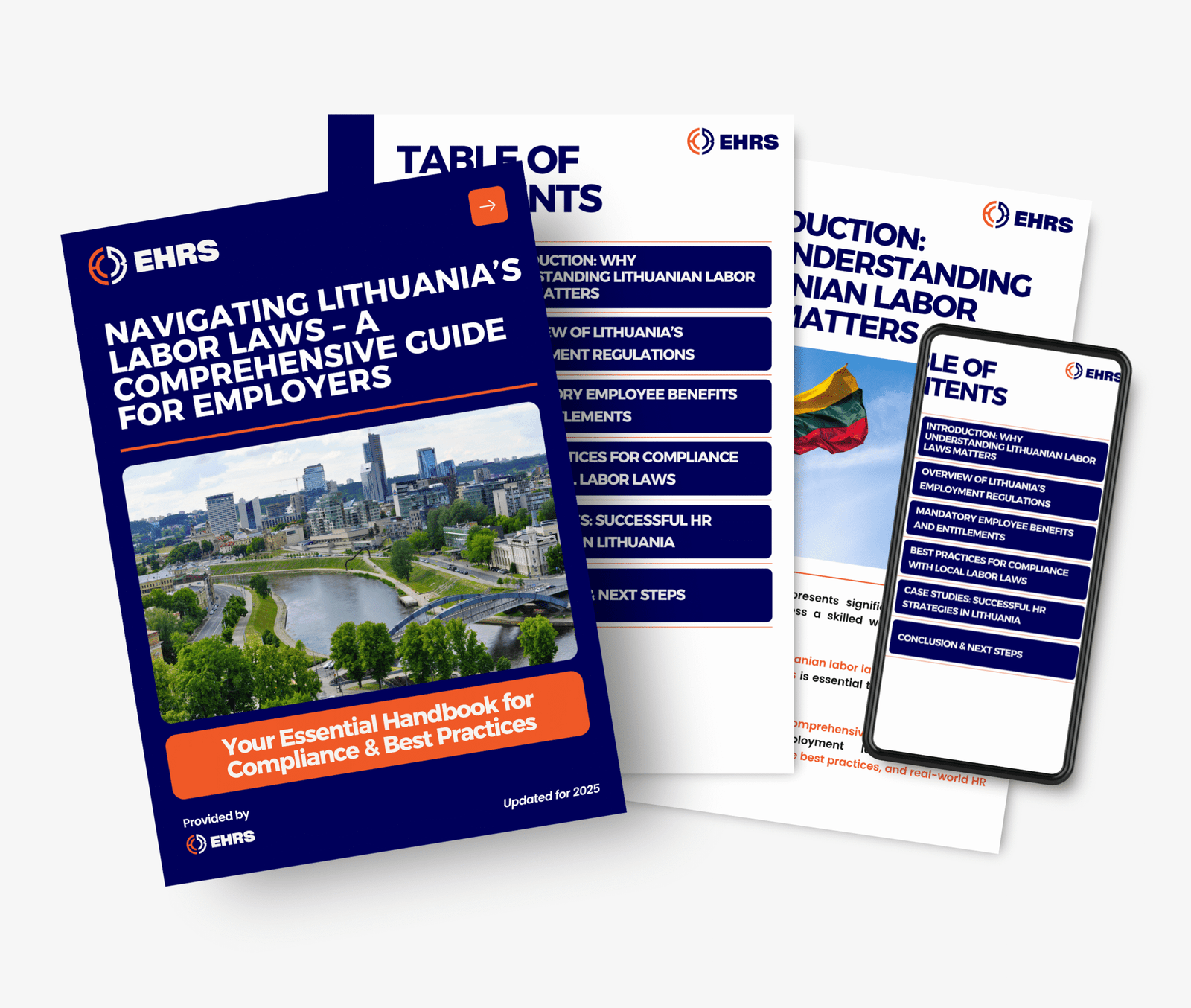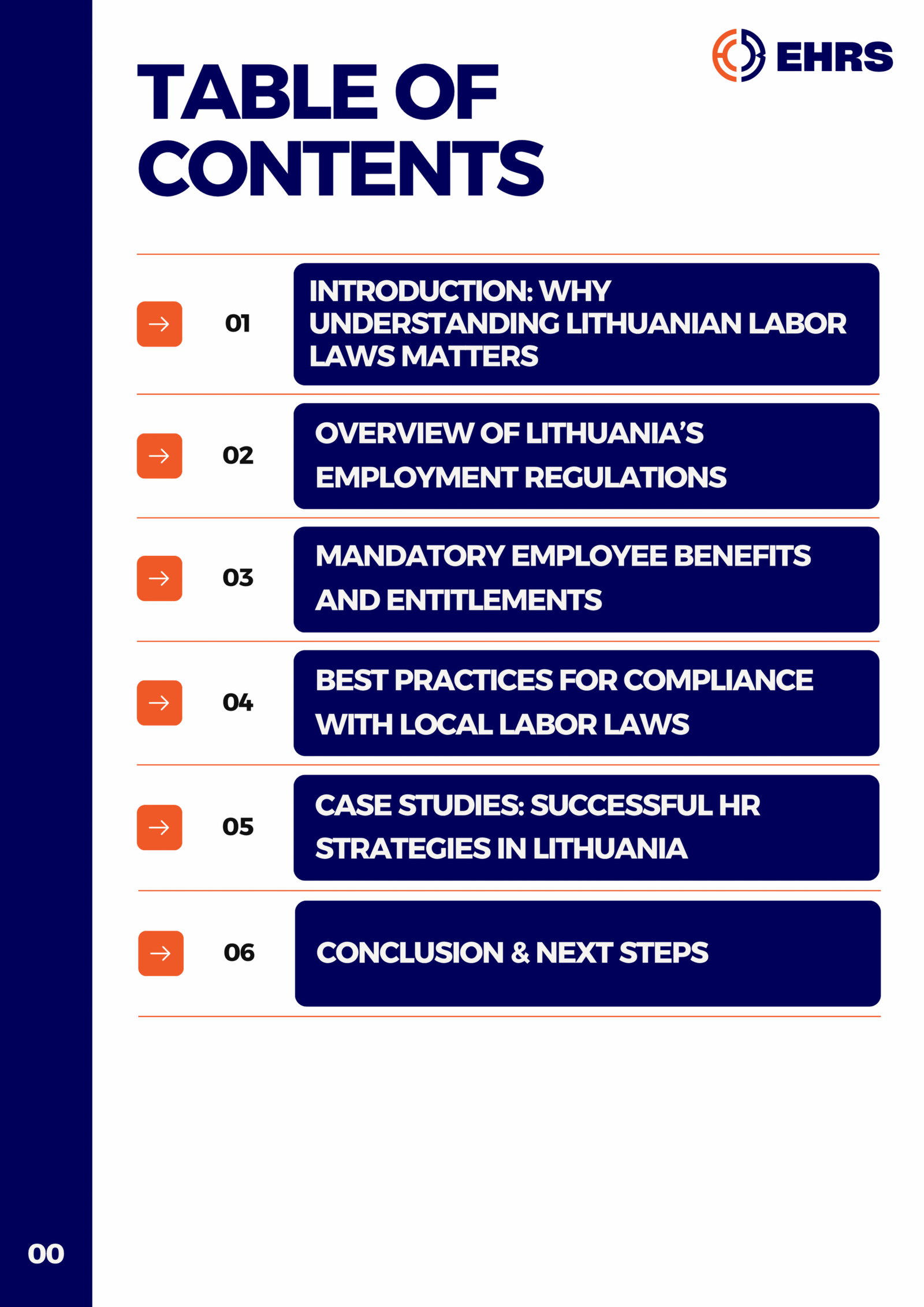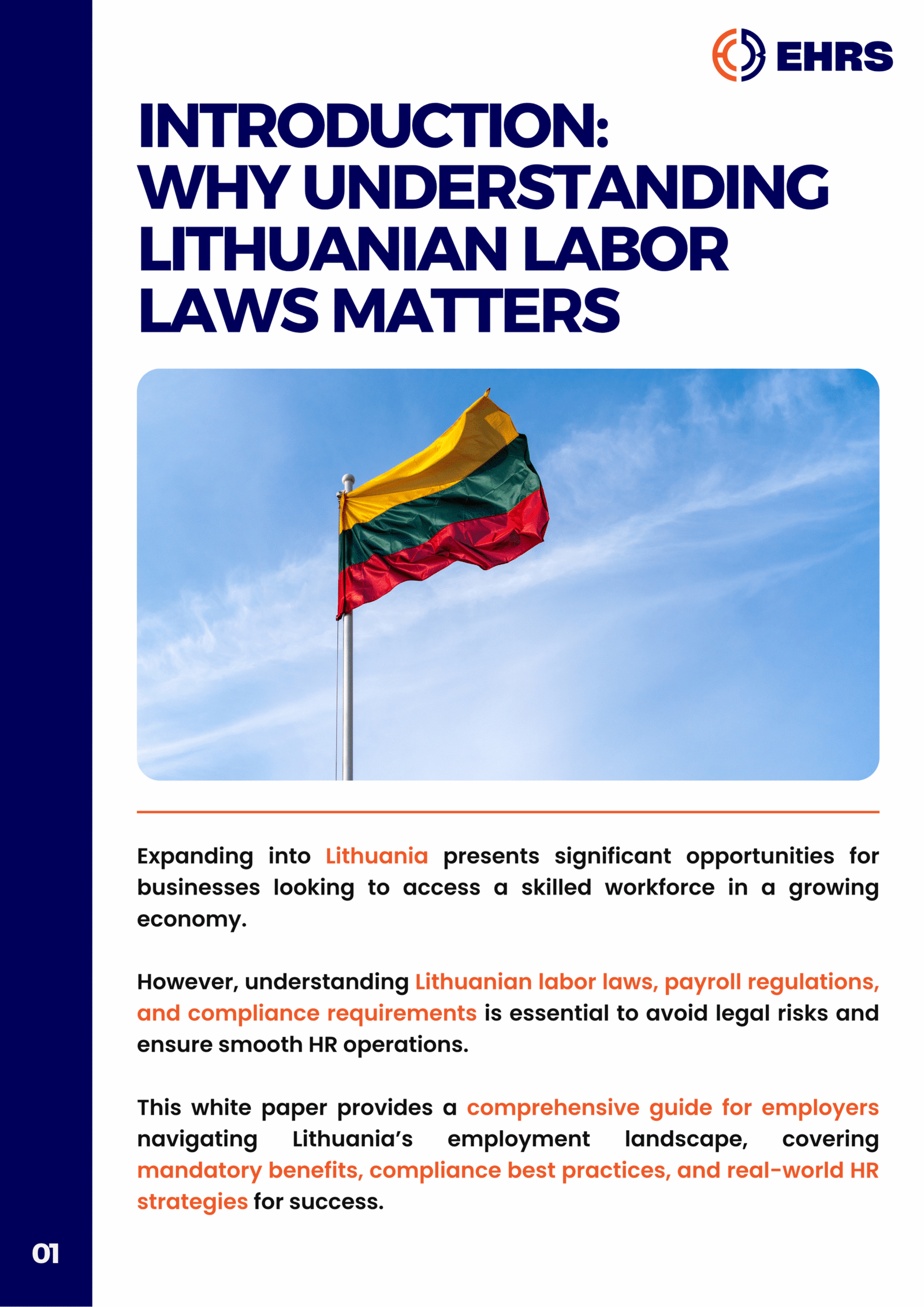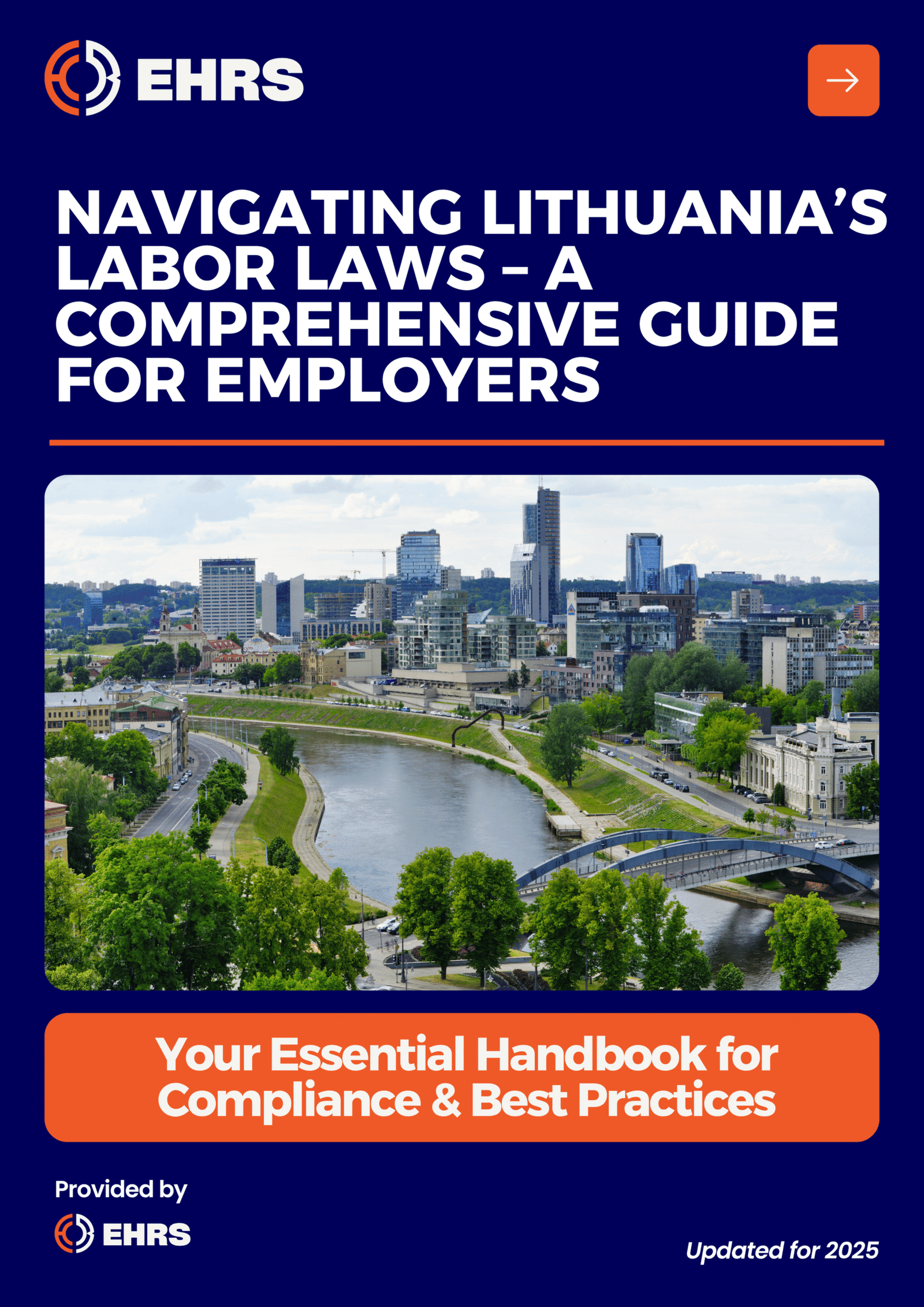LITHUANIA
List of countries
HR Services for Lithuania
Hire in Lithuania without opening a local entity. We manage employment contracts in compliance with Lithuanian labor law, handle social security and tax registrations, oversee payroll, and ensure full legal compliance. Our tailored HR services for Lithuania help your business expand smoothly while staying fully compliant.
According to the U.S. Department of State, Lithuania offers one of the most open, innovation-driven economies in the European Union. With a strong commitment to digital transformation, rule of law, and economic resilience, Lithuania has become a leading hub for fintech, life sciences, and shared service centers in the Baltics. The country boasts a highly educated workforce, sound fiscal policies, and a transparent regulatory environment that consistently attracts U.S. and global investment. As a member of the EU, Eurozone, and Schengen Area, Lithuania provides seamless access to European markets and a stable platform for regional growth.
However, HR operations in Lithuania can still present challenges for U.S. and UK companies unfamiliar with local labor laws, social security contributions, and employment documentation requirements. Employment contracts must comply with the Lithuanian Labor Code and be provided in Lithuanian, with clear terms for working time, compensation, and notice periods. Employers must also meet strict obligations regarding paid leave, occupational safety, and social tax reporting. Building an internal HR team can lead to delays and compliance risks. By outsourcing HR to a local partner like EHRS, companies can simplify market entry and ensure that contracts, payroll, and employee records are fully compliant with Lithuanian and EU labor law—backed by modern digital infrastructure and a business-friendly environment.
ALL YOU NEED TO KNOW ABOUT
HR OUTSOURCING IN LITHUANIA
LITHUANIAN EMPLOYMENT
REGULATIONS TO KNOW
THE BENEFITS OF
EXPANSION IN LITHUANIA
THE CHALLENGES OF
EXPANSION IN LITHUANIA

Check our free HR guide to help you quickly improve your HR in Lithuania
FAQ for Lithuania
Learn more about Lithuania
Free Download
Request your free guide and receive it immediately

All You Need to Know About Outsourcing
Your HR in Lithuania with EHRS
Comprehensive HR Outsourcing Support
EHRS delivers seamless HR management in Lithuania, supporting everything from employment contracts and payroll to onboarding, leave tracking, and digital compliance reporting. With our expert HR services for Lithuania, you can focus on scaling your business while we handle all HR obligations locally.
Expert Navigation of Lithuanian Labor Law
Lithuania’s Labor Code mandates specific contract terms, social contributions, and detailed employee protections. EHRS ensures your business operates within all national and EU frameworks—minimizing risk and ensuring peace of mind.
Scalable and Digitally Efficient HR Solutions
Thanks to Lithuania’s advanced e-governance systems, HR processes can be managed swiftly and securely. EHRS offers flexible support tailored to your growth stage—ideal for both startups and global teams expanding in the Baltics.
Lithuanian Employment Regulations to Know
Employment Contracts
All employment relationships in Lithuania require written contracts in Lithuanian. As part of our comprehensive HR services for Lithuania, we ensure contracts specify working conditions, salary, job function, and probation periods (if applicable), and are properly registered with the national employment authority (Sodra).
Working Hours & Leave
The standard workweek is 40 hours. Employees are entitled to at least 20 working days of paid annual leave, with additional rights for long-term employees, parents, and young workers. Public holidays are also mandatory days off.
Social Insurance & Tax Reporting
Employers must register all employees with Sodra and pay social security contributions covering pensions, health insurance, and unemployment. Monthly payroll declarations and digital reporting are mandatory and closely monitored.
The Benefits of Expansion in Lithuania
Digitally Advanced Economy
Lithuania is a leader in digital public services and e-governance. Setting up and managing HR functions can be done efficiently through streamlined online systems—saving time and resources.
Educated, Multilingual Workforce
Lithuania offers a well-educated labor force with strong capabilities in IT, finance, life sciences, and logistics. English is widely spoken, particularly among younger professionals and the tech sector.
EU and Eurozone Access
As an EU and Eurozone member, Lithuania offers regulatory alignment, financial stability, and unrestricted access to the European single market—making it a reliable platform for regional operations.
The Challenges of Expansion in Lithuania
Local Legal Complexity
Despite a business-friendly environment, Lithuanian employment law contains strict requirements for dismissals, probation terms, and work time accounting. Non-compliance can lead to penalties and employee disputes.
Mandatory Use of Lithuanian in Contracts
Employment documents and contracts must be drafted in Lithuanian. Accurate legal translation is crucial to avoid misinterpretation and ensure enforceability.
Administrative Compliance Requirements
From employee registrations to monthly tax filings, HR administration must be handled precisely. Without local expertise, these tasks can slow down operations and increase the risk of errors.
Talk to an HR specialist about payroll, compliance, and audits today.
Expand into Lithuania with confidence.
Most Asked Questions
About Lithuania
Why do I need a written employment contract in Lithuania? Aren’t verbal agreements enough?
Verbal agreements are not compliant with Lithuanian labor law. Employers must provide written employment contracts outlining key terms, such as salary, job duties, and working hours. Failure to do so can result in fines and legal disputes.
Why It’s Risk-Free: We ensure your contracts meet all Lithuanian legal requirements, protecting your business from potential claims and ensuring clarity for both parties.
Do I really need to track working hours in Lithuania? Isn’t trust more important?
Lithuania’s Labor Code mandates tracking of working hours. Standard hours are 8 hours per day and 40 per week, with overtime restrictions. Failure to document hours can result in fines or employee grievances.
Why It’s Risk-Free: We help you implement time-tracking systems, ensuring compliance while fostering a flexible work environment
How much annual leave do I need to provide? Isn’t the statutory minimum sufficient?
Employees are entitled to a minimum of 20 working days of annual leave. Additional leave may be granted through contracts or collective agreements. Offering only the minimum might harm retention.
Why It’s Risk-Free: We create leave policies that balance legal compliance with competitive benefits, helping you attract and retain top talent.
Parental leave in Lithuania seems long. How can I maintain productivity with employees away for so long?
Parental leave in Lithuania is generous, allowing up to 3 years of leave, though the employer isn’t required to pay salaries during this period. Proper workforce planning ensures continuity.
Why It’s Risk-Free: We assist with leave planning and compliance, helping you manage absences without disrupting operations.
Are collective agreements (CAs) mandatory in Lithuania? Can’t I just set my own policies?
Collective agreements are not mandatory but are common in certain industries. They regulate wages, benefits, and working conditions, ensuring fairness and compliance with industry standards.
Why It’s Risk-Free: We evaluate whether CAs apply to your business and align your policies accordingly to avoid disputes or non-compliance.
How do payroll taxes work in Lithuania? What happens if I make an error?
Employers must deduct income tax and social security contributions from salaries. Errors in reporting or payments can lead to audits and penalties from tax authorities.
Why It’s Risk-Free: We manage payroll compliance, ensuring accurate deductions and timely filings with Lithuanian authorities.
Do I need to focus on health and safety in Lithuania? Isn’t that just common sense?
Employers are legally required to ensure workplace safety under Lithuania’s Occupational Safety and Health Law. Risk assessments and safety measures are mandatory.
Why It’s Risk-Free: We conduct risk assessments and implement safety policies, ensuring compliance and a safe work environment for your employees.
Is compliance really worth the cost? Won’t it just increase my overheads?
The cost of non-compliance—fines, legal disputes, and employee turnover—far outweighs the investment in getting things right. Compliance also builds trust and operational stability.
Why It’s Risk-Free: We streamline compliance processes, saving you time and money while ensuring your business operates smoothly and legally.
Are probation periods necessary? Can’t I just terminate a new hire if they don’t work out?
Probation periods, capped at 3 months (extendable to 6 months in certain cases), allow for easier termination. Without one, employees gain full legal protections, making dismissals more complex.
Why It’s Risk-Free: We structure probation terms that comply with Lithuanian labor law, giving you flexibility during the hiring process
Is overtime pay mandatory? Can’t I just offer time off instead?
Overtime pay is mandatory unless compensatory time off is agreed upon. Overtime hours must be compensated at a minimum of 150%-200% of the regular wage.
Why It’s Risk-Free: We help you set clear overtime policies aligned with Lithuanian labor laws, preventing misunderstandings and ensuring compliance.
Do I need to pay employees during sick leave? Isn’t this handled by the state?
Employers are required to pay 62.06% of the employee’s average salary for the first two days of sick leave. After that, benefits are managed by the State Social Insurance Fund.
Why It’s Risk-Free: We handle sick leave processes and filings, ensuring compliance and reducing administrative burden on your team.
Termination laws in Lithuania sound restrictive. What if I need to reduce staff quickly
Terminations must comply with Lithuania’s Labor Code, which requires valid reasons, adherence to notice periods, and severance pay in some cases. Non-compliance can result in legal claims or fines.
Why It’s Risk-Free: We guide you through legally compliant termination processes, minimizing risks and protecting your business.
Are pensions mandatory in Lithuania? Isn’t salary enough to retain employees?
Employers must contribute to Lithuania’s statutory social insurance system, which includes pensions. Offering additional pension benefits can enhance your attractiveness as an employer.
Why It’s Risk-Free: We ensure compliance with pension contributions and help design competitive packages that support employee retention.
Can I hire non-EU workers in Lithuania? Isn’t the process too complicated?
Non-EU workers require a work permit and a residence permit, depending on the role and qualifications. Failing to comply can result in fines or delays.
Why It’s Risk-Free: We handle the permit application process, ensuring compliance and efficient onboarding for international talent.
What happens if I fail a compliance audit in Lithuania? Could it disrupt my operations?
Non-compliance with Lithuanian labor laws can result in fines, back pay claims, or operational restrictions. Audits often focus on contracts, payroll, and workplace safety.
Why It’s Risk-Free: We proactively review your policies and processes, ensuring you’re prepared for inspections and fully compliant with regulations.



